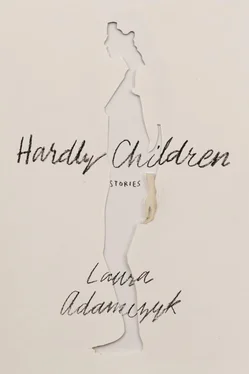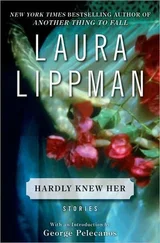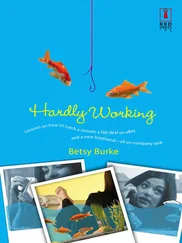She turns. A shameful heat opens in her stomach so fast it’s like she’s wet her pants. The sun is bright around her sister, the upward slope of her small, tanned nose, her brown hair hanging at her shoulders, but she looks like someone different. The middle’s heart beats big inside her throat.
I wasn’t doing anything, she says.
Yeah, right. That’s gross.
It’s not gross, the middle says, but there’s no conviction in her. She cannot feel good about a thing she doesn’t have a name for.
It’s time to go, her sister says.
Back on the highway, the middle starts crying. Silently at first, but her heavy breathing gives her away.
Are you crying? The father leans over to look at the middle. He does a triple take between her and the road. She turns away from him, and her shoulders start to shake.
No, no, no, what’s wrong? No, it’s okay.
What? Really ? The oldest looks at her, leaning in. Are you kidding me? She sighs and looks out the window.
The middle hangs her head, trying to make it so that neither her father nor her sister can see her face. What’s the matter, the youngest asks. The father fumbles with the tape deck.
Hey, c’mon, he says.
Everybody’s attention gets her going harder and louder.
Oh, jeez, says the oldest.
I miss Mama too, the youngest says, putting a small hand on her shoulder, and it is like when the middle is sad at home and their border collie noses her cheek. Her face crinkles, and the youngest starts up too. I wanna go home, the youngest says.
C’mon, don’t you start now, the father says, hitting play on the stereo. The music comes blasting out in the middle of the song. He turns it up louder than before, and the two cry harder.
Hey, hey, the father says, motioning with his hand, a bigger version of the dance they did earlier. The youngest moves deeper into the crying until it gets away from her. The father turns off the music, and the middle stops abruptly, wiping her face with the back of her hand. She swallows and the father reaches over to mess her hair.
* * *
THE DRIVE GOESon and on. Flat, open, dull. An anxious, geared-up lull. Time crackles and breaks once they enter the park, as soon as they see the brown official sign announcing its name in white, carved-out letters. The father tells the girls to hop out. One on either side of the sign and one at the bottom. The middle and youngest put their arms around it, as though it is a fifth family member. They collect these photographs the same way people buy magnets or badges or tiny spoons with the park seal stamped on them. They don’t have the money for these trinkets, and though the girls secretly, sepa rately, desire them, they have come to view them with disdain, as a frivolity they don’t want anyway.
They follow the park road up the mountain, one side in shadow, sunlight pushing through fat clouds on the other. The campground is on the north rim of the canyon—dry pines, shadow and sun, pale dirt. A handful of colorful tents dot the spare forest. The girls don’t see any other children, just middle-aged couples scattered among the dozen spots—men with gray beards, women wearing bandanas over their long hair. They make a slow circle around the sites then take a spot on the edge. The father backs the trailer into the thin slice of tar pavement, then clips the pay stub onto the signpost, claiming the spot as their own. Some people have wooden plaques with their names in burned-out letters hanging from their trailers. THE JOHNSONS. THE WARNERS. These are the same people who put potted geraniums outside their trailer doors, the same who roll out a carpet of fake grass beneath their striped awnings. A home away from home. The middle sister never saw her parents kiss or hug—nothing like it—and now there are only listless waves from cars or front porches, flat-toned telephone conversations in which the mother tells the father that the girls shouldn’t eat so much candy. When she is twenty-five, the middle, alone in an art museum in Toronto, an otherwise unremarkable, unmemorable museum—a large, modern thing—will walk through a curving hallway into a white, open room, completely empty but for a man and a woman on the floor kissing. Their bodies longways on the blond, lacquered wood. The man will be on top of the woman, the two of them rubbing against each other with a slow, deliberate intensity. She will think their passion is a performance, some unmarked exhibit. Even so, a heat will swell in her stomach and her face will grow red, suspended in the eroticism of no possible relief or release. Stopped, standing in place, she will resume her slow walk at the edge of the room, so as not to appear taken, affected, anything. She will keep the couple in her periphery. The woman, blonde like her, her jeans tight around her ass, the man’s hands at her waist. Nothing will stop them; they will give no sign they know she is there. The middle will carry the memory of the couple for years but won’t tell anyone, won’t remember anything else about the museum or the pair except the careful distance she kept between herself and them.
* * *
THE FIRST STEP INSIDEthe camper shows everything shifted, disrupted and wrong, as a house recently burgled. A cabinet door open, a box of cereal on the floor. They put it in order. They take the cardboard box of newspaper off the floor, place it out next to the fire pit. The middle and the youngest unroll their sleeping bags on the bunks by the door.
What are we going to do after this? the middle asks. Are we going to have a fire tonight?
Of course we will, the oldest says.
They drive to the visitors’ center. They wander through an exhibit on railways, another on how glaciers formed the canyon thousands of years before. They see the area’s animals, stuffed and behind glass. A chipmunk clutching a branch. A mountain lion hunched on a high slab of rock. They read about what they eat, their prey and predators, where humans might see them. They play a game matching the animal to its tracks and droppings. The plaque reads, They’re all you’ll ever see of some species .
Returning to the site, the father climbs onto the trailer’s bottom bunk to take a nap. It is the hot, quiet slump in the day, and the cars and trucks are missing from the other sites. The oldest reads at the picnic table, and the middle and youngest hang together in the hammock.
When are we going home? the youngest asks.
We just got here, the oldest says, not taking her eyes off her book.
Two weeks, the middle says. Like last summer.
I want to talk to Mama.
You can’t talk to Mom, the oldest says.
Why not?
The pay phone is all the way down at the entrance. It’s too far.
I want to talk to her.
We can tomorrow, the middle says.
The youngest wedges herself out of the hammock. The middle watches her walk to the trailer and step up onto its metal step.
What are you doing, the oldest asks.
I want to see if Dad will take me.
He’s sleeping.
I want to talk to Mama, she says more insistently.
You’ll hurt Dad’s feelings, the oldest says.
The youngest crosses her arms and sighs, stamping over to the fire ring and huffing down onto a fat log. Her face crumples and her chest heaves.
Hey, c’mon, the middle says. Don’t cry.
You guys are such babies, the oldest says.
The youngest puts her thumb in her mouth, her brow knitted, angry and concentrating. She wraps her other arm around her stomach. She closes her eyes, and her mouth starts going, her face softening. Her mother did so much to get her to stop last year. At night, she duct-taped socks over her hands. She rubbed fishing lure gel on her thumbs, but they would find her in the morning with the socks torn off, the gel smeared around her mouth like melted ice cream. The mother kept socking her hands, and the youngest kept ripping them off. Stubborn, stubborn, then she stopped cold, and it seemed like that was that. Around this time, the youngest started bringing her toy vacuum cleaner into the bed to sleep with her. Nearly the length of her body, a white, smooth plastic, its base a clear dome inside of which whir tiny Styrofoam balls when it’s pushed. She calls it by the neighbor boy’s name, a boy with a head of tight blond curls whom they see out at the beach club the mother’s family belongs to. Her sisters tease her whenever they see him, draw out the syllables of his name in a long Oooo . At night, she lays an arm and a leg around the toy, and the mother, worried about the youngest’s teeth, lets her keep it in her bed, as though it were nothing more than a stuffed animal.
Читать дальше











